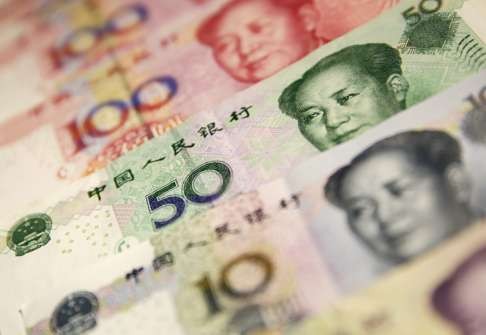
Pace of renminbi internationalisation slows amid shifting political, economic dynamics
With new issuance expanding to the United States, Beijing’s commitment to reforms remains but at a slower pace, say analysts
While the pace of renminbi (RMB) internationalisation overall is slowing, further progress is being made, with the Chinese currency starting to make headway in the United States.
The eighth China-US Strategic and Economic Dialogue will be held in Beijing June 6-7 and the meetings could lead to further progress in the renminbi’s internationalisation, according to HSBC forex analysts Paul Mackel and Joey Chew.
“The US is conspicuously missing from the growing list of territories with RMB swap lines and clearing centres. But signs are pointing to this potentially changing,” they wrote in a research note.
Two indications of further RMB usage in the US may have been seen last week. On Monday, Industrial and Commercial Bank of China (ICBC) issued its first renminbi-denominated certificate of deposit, which enables institutions to issue and clear RMB denominated products denominated in the US. Then on Wednesday, ABC New York was the first Chinese financial institution in the US to issue an offshore RMB bond, with Standard Chartered as its manager and procurement agent.

“This deal is a positive step towards increasing RMB internationalisation in the US,” Rodrigo Gonzalez, debt capital markets head for the Americas at Standard Chartered, said. “In North America, in addition to issuances from Canadian financial institutions, the US has recently set up a working group to identify, evaluate and recommend opportunities to develop and expand trading, clearing and the settlement of the RMB in the US,” he added.
Separately last week, China’s Ministry of Finance announced the issuance of a sovereign renminbi offshore bond in London, the first offshore renminbi bond issued by the ministry outside China. “The Ministry of Finance’s latest issuance of offshore renminbi (RMB) bonds is another important step forward in the internationalisation of China’s currency,” Helen Wong, chief executive, Greater China, for HSBC, said in a statement.
However, while the RMB internationalisation programme is continuing to rack up firsts, more immediate economic concerns are proving to have an effect on the overall rate of progress.
“The renminbi internationalisation process has clearly decelerated a bit from its breakneck speed since inception, slowing most notably since mid-2015 as near-term economic considerations take a front seat to planned reforms,” Evan Goldstein, Deutsche Bank global head of renminbi solutions, said.
Lo Chi, Hong Kong-based senior economist for Greater China at BNP Paribas Investment Partners, agrees that the pace of change is slowing, adding that “this is not a new era for RMB internationalisation”. Rather, he said three key developments since late 2014 may have caused Beijing to stall the internationalisation strategy.
The first is that global growth and interest rate dynamics have made it harder for Beijing to defend its strong renminbi policy stance. When China’s economic growth was strong compared with the rest of the world it was easier to defend a strong currency bias, Lo noted.
The second is that, from Beijing’s perspective, the role of renminbi internationalisation as a force to push through financial deregulation has largely been completed, as seen by the decision to add the renminbi to SDR basket in December 2015.
The third development is that renminbi internationalisation seems to have turned from a political boon to a bane for Beijing.
“The success of the CNH market in making the renminbi more widely used has also allowed offshore players to sell the Chinese currency short. This has created unwelcome volatility in the internationalisation process just when the pressure of structural rebalancing on China’s domestic economy is also intensifying,” Lo wrote in a report on the subject. “All this is not to say that the internationalisation initiatives have failed. They are just being slowed down,” he said.
Deutsche Bank’s Goldstein also sees the internationalisation process continuing further. “The change in pace of reform shouldn’t be interpreted as a change in commitment to reform; the government and regulatory agencies have shown a pragmatic approach to opening the capital account to inflows where and when possible,” he said.

